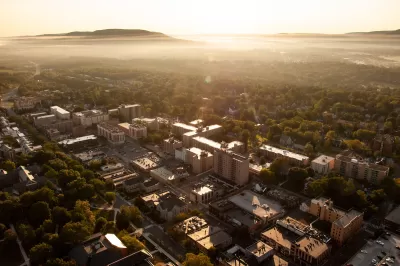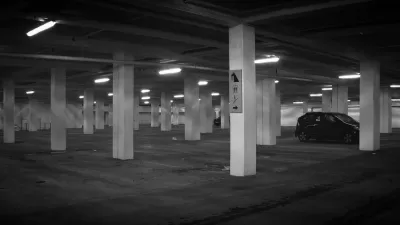The borough’s council voted to reverse its decision to demolish several legacy businesses to build a new parking garage.

When the community of State College, Pennsylvania decided to demolish three downtown businesses via eminent domain to make way for a new parking garage, local residents mobilized to fight the project. As Asia Mieleszko writes in Strong Towns, the group, Strong Towns Happy Valley, gathered local support to rescind the decision.
Business owner Jay Horgas, who owns one of the buildings in question, says he was told several years ago his business would not be in danger. “Furthermore, when all was said and done, he was never personally notified. Instead, he learned he’d lose his business, The Brewery, in operation since the 1960s, when a reporter reached out for comment on August 7.”
According to Mieleszko, “The immediate vicinity is served by several paid parking lots, garages, and on-street parking: the crumbling yet still operational Pugh Street Garage is a block away, the block of the bar has the McAllister Parking Deck, and a five-minute walk produces at least two parking lots and the Fraser Street Garage.” Parking amounts to roughly 20 percent of the area’s commercial district. Many of them have “plenty of spaces available” even during the busiest times, like Penn State college football game days.
After a petition protesting the project garnered 5,000 signatures and with hundreds of people present in person and virtually to protest the project at an August 21 council meeting, the borough council brought the issue to a vote and reversed the decision. While the parking garage isn’t entirely off the table, the move signals the importance of grassroots organizing.
FULL STORY: State College Chose Parking Over People. The People Fought Back.

Alabama: Trump Terminates Settlements for Black Communities Harmed By Raw Sewage
Trump deemed the landmark civil rights agreement “illegal DEI and environmental justice policy.”

Planetizen Federal Action Tracker
A weekly monitor of how Trump’s orders and actions are impacting planners and planning in America.

The 120 Year Old Tiny Home Villages That Sheltered San Francisco’s Earthquake Refugees
More than a century ago, San Francisco mobilized to house thousands of residents displaced by the 1906 earthquake. Could their strategy offer a model for the present?

In Both Crashes and Crime, Public Transportation is Far Safer than Driving
Contrary to popular assumptions, public transportation has far lower crash and crime rates than automobile travel. For safer communities, improve and encourage transit travel.

Report: Zoning Reforms Should Complement Nashville’s Ambitious Transit Plan
Without reform, restrictive zoning codes will limit the impact of the city’s planned transit expansion and could exclude some of the residents who depend on transit the most.

Judge Orders Release of Frozen IRA, IIJA Funding
The decision is a victory for environmental groups who charged that freezing funds for critical infrastructure and disaster response programs caused “real and irreparable harm” to communities.
Urban Design for Planners 1: Software Tools
This six-course series explores essential urban design concepts using open source software and equips planners with the tools they need to participate fully in the urban design process.
Planning for Universal Design
Learn the tools for implementing Universal Design in planning regulations.
Clanton & Associates, Inc.
Jessamine County Fiscal Court
Institute for Housing and Urban Development Studies (IHS)
City of Grandview
Harvard GSD Executive Education
Toledo-Lucas County Plan Commissions
Salt Lake City
NYU Wagner Graduate School of Public Service





























